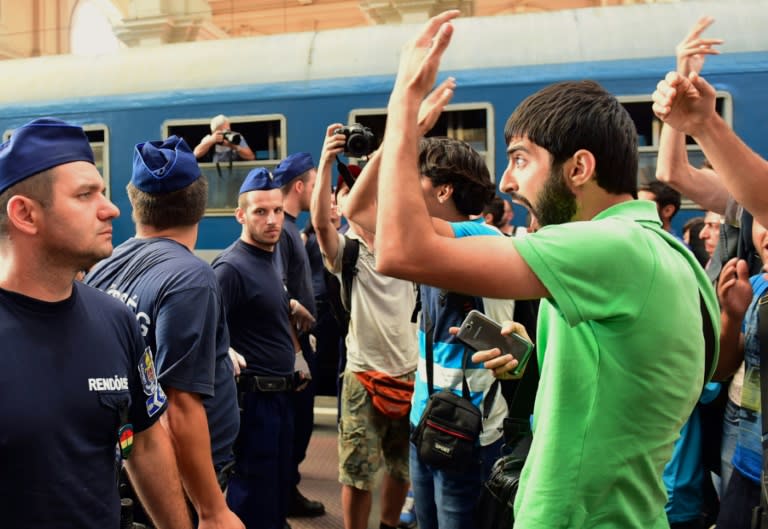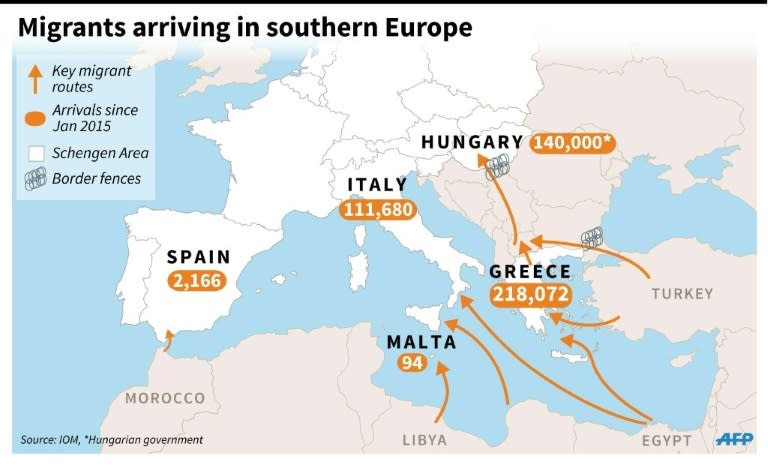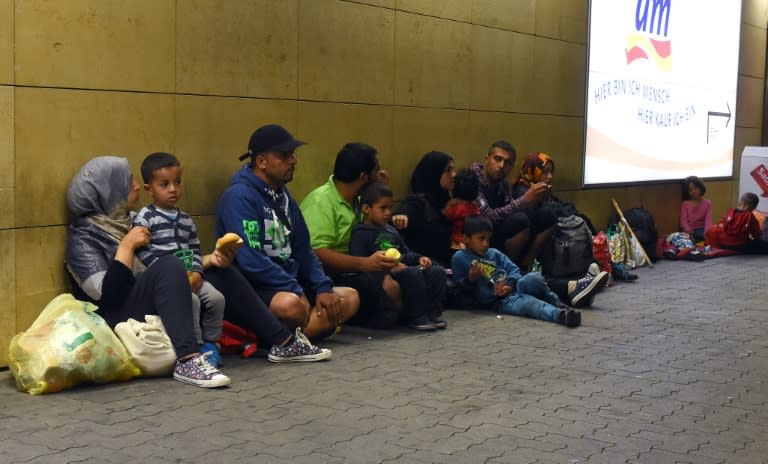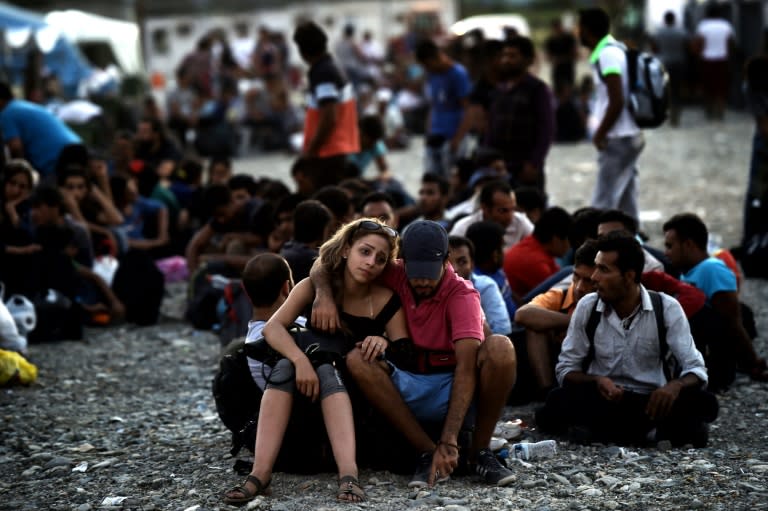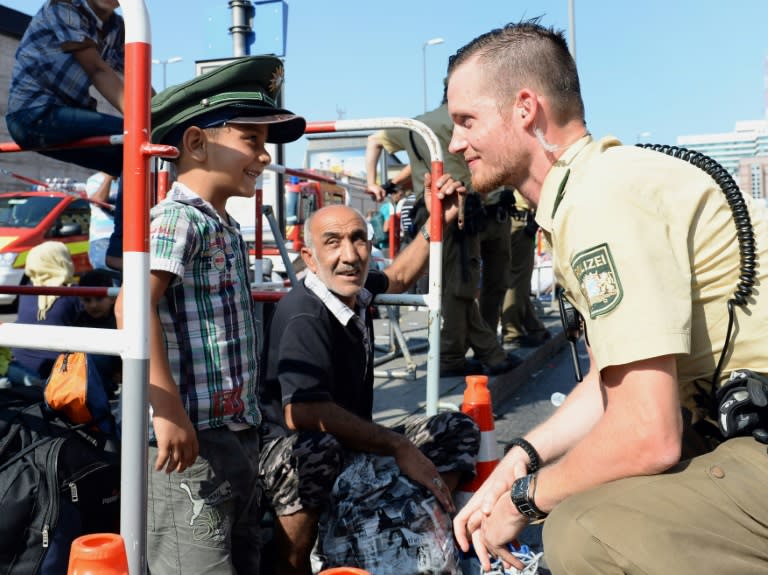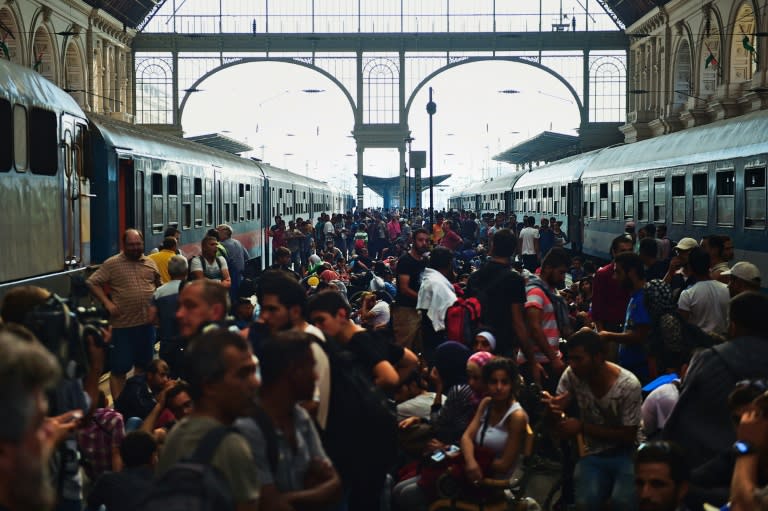Europe in new migrant standoff as figures show scale of crisis
Hundreds of migrants were left stranded outside Budapest's main railway station after being barred from travelling to Germany by police, as new figures highlighted the massive scale of Europe's refugee crisis. Europe is facing the largest movement of people since World War II, which has seen more than 350,000 make the perilous journey across the Mediterranean this year, fresh figures from the International Organization for Migration (IOM) showed. Countries on Europe's eastern borders have also been struggling to cope, and fresh chaos erupted on Tuesday as police cleared and briefly shut Budapest's Keleti station a day after thousands of migrants boarded trains for Germany and Austria. Outside Keleti station, around 500 mainly Syrian migrants, blocked from the entrance by a police line, chanted "Germany! Germany! Hungary, let us go!" Some held placards calling for the UN to step in, while a protester hoisted on another's shoulders held up a Germany football shirt to cheers. The police continued to hold them back, though, and by midnight the tension had eased, with most of the migrants retreating to a nearby makeshift refugee shelter to sleep, many vowing to return to the station entrance in the morning. "What else can I do," Ahmad Orabi, a 25 year-old Syrian from Homs, told AFP. "I've come so far, I can't give up now." The ban was enforced just 24 hours after police had unexpectedly allowed people stuck for days in camps to leave Budapest, with hundreds surging onto trains bound for Germany and Austria, despite many not having EU visas. This saw the highest number of migrants entering Austria in a single day this year, with police saying 3,650 arrived in Vienna by train on Monday. Many continued on to Germany, which last week eased asylum restrictions for Syrian refugees, where police said a record 3,500 asylum-seekers had turned up in Bavaria on Tuesday. Sweden also said the number of asylum requests there was nearing historic levels. - 'Time is running out' - The latest flashpoint, one of several recent standoffs at borders and transport hubs across the continent, came as the IOM published new figures revealing the scale of Europe's biggest migrant crisis since World War II. Out of the 350,000 arrivals by sea so far this year, 234,770 alone were in Greece -- more than the Europe-wide total for all of 2014. At least 2,600 died trying to reach Europe, either by drowning or suffocating in packed or unseaworthy boats, the agency said. Stories of refugees dying in horrific conditions crammed inside lorries have piled the pressure on the EU, which has scheduled emergency talks for September 14. The crisis has stoked friction in the 28-member bloc over helping to share the burden of "frontline" nations where the migrants arrive by sea or land, and about where those who are granted asylum will be settled. The influx is Europe's "greatest challenge", Spanish Prime Minister Mariano Rajoy said Tuesday during talks in Berlin with German Chancellor Angela Merkel, whose country expects to accept a record 800,000 migrants this year. Interior Minister Bernard Cazeneuve said "time is running out" to tackle the crisis at European level, while European Council President Donald Tusk said the priority for leaders must be "to prevent migrants from losing their lives trying to reach Europe". - 'Prison cell on wheels' - Their comments came as hundreds of Eurostar passengers were left stranded in the dark on Wednesday morning after "intruders" made their way onto the tracks, in the latest disruption to the cross-Channel service by suspected migrants trying to reach Britain. Much-flouted EU rules, known as the Dublin regulation, say refugees should be processed in the first country they reach but the human tide is so great that this system is now badly under strain. Hungary, where 50,000 migrants arrived in August, insists it cannot cope and has built a razor-wire fence along its border with Serbia, drawing criticism from France and Austria. In Slovakia, meanwhile, police stopped several hundred far-right protestors from entering the village of Gabcikovo, south of Bratislava, which is due to host around 500 migrants after a deal with their current host Austria. Another anti-migrant protest took place in the city of Trnava, northwest of the capital. The migrants' plight was brought sharply into focus last week after 71 people, including four children, were found dead in an abandoned truck on an Austrian motorway near the Hungarian border. Police in Hungary and Bulgaria have made six arrests. Austrian police said on Tuesday they had rescued 24 young Afghan migrants, most aged around 16 or 17, crammed inside a van that was like a "prison cell on wheels". "They had been packed into this dangerous vehicle like objects," a spokesman told AFP. The EU's Frontex border agency said a brisk trade in fake Syrian passports had emerged, mostly in Turkey, as migrants knew escapees from the war-torn country were given preferential treatment.

